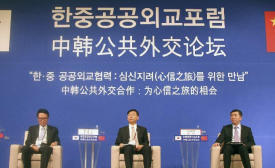south korea
There is a submerged rock in the Yellow Sea that seafaring Korean families once believed to be the home of the spirits of dead fishermen. The rock’s name in English is Socotra Rock; in Korea, it’s referred to as Ieodo, and in China the Suyan Rock. Whatever the language, it’s at the center of a new global hot zone that is threatening to destabilize relations in East Asia.
China seemed to take the air out of the Geneva Accord on Iran with its simultaneous announcement last week that it is creating an Air Defense Identification Zone (ADIZ) in the East China Sea. The ADIZ will be implemented by the Chinese Ministry of Defence and obliges all aircraft flying in the zone to accommodate a number of rules including: the identification of flight plans, the presence of any transponders and two-way radio communication with Chinese authorities.
The main streets of Shin-Okubo — Tokyo’s Koreatown — are lined with smoky barbecue restaurants and overlit cosmetics emporiums. Staircases lead down to basement music venues and up to hidden drinking holes. Japanese once thronged the neighborhood, which is home to many ethnic Koreans and known for its fiery food and late nights. But in recent months, the crowds have thinned, replaced by anti-Korean protesters who have turned Shin-Okubo into a rough barometer of deteriorating Japan-Korea relations.
Numerous governments and citizens throughout the world would like to see an effective counterbalance to China in East Asia. Korea, with its commitment to democracy, sophisticated economy, and long-established ties to the United States and other Western countries, is in a strong position to play this role, if it chooses to do so.

SEOUL --- At a conference here sponsored by the Korea Foundation, several dozen scholars and practitioners grappled with questions related to Korea’s global and regional diplomatic posture. My own suggestions as a conference participant centered on two questions
• How does public diplomacy relate to the strategic interests of Korea as a leader in East Asia and more specifically as a counterweight to Chinese influence?
• In what ways might new media be used to enhance Korea’s development of innovative public diplomacy programs?
Last week, Rodrigo Tavares wrote in Foreign Affairs about Brazil’s recent involvement in paradiplomacy, or subnational foreign relations, by establishing formal bilateral relations between São Paulo and the UK. According to the article, the U.S. established a similar agreement with the world’s ninth largest city this past March - the first time that the State Department has forged direct relations with a subnational government in the southern hemisphere.
After declaring the nation “open for business,” Australian Prime Minister Tony Abbott has set a target of achieving free trade deals with China, Japan and South Korea within just 12 months. Can the recently elected leader succeed where his predecessors failed? Having stated at the APEC summit in Bali that he wished to swiftly conclude eight years of negotiations with China, Abbott told reporters at last week’s East Asian Summit in Brunei that he was adding the nation’s second and third-biggest trading partners to the target list.
Movies from South Korea and Mongolia have won $30,000 New Currents Awards for emerging filmmakers at Asia’s largest film festival. Busan International Film Festival organizers said Saturday that the festival’s biggest prizes went to “Pascha” by South Korean director Ahn Seonkyoung and “Remote Control” by Mongolia’s Sakhya Byamba. It’s the first time a Mongolian movie entered and won the competition in the festival’s 18 years.







